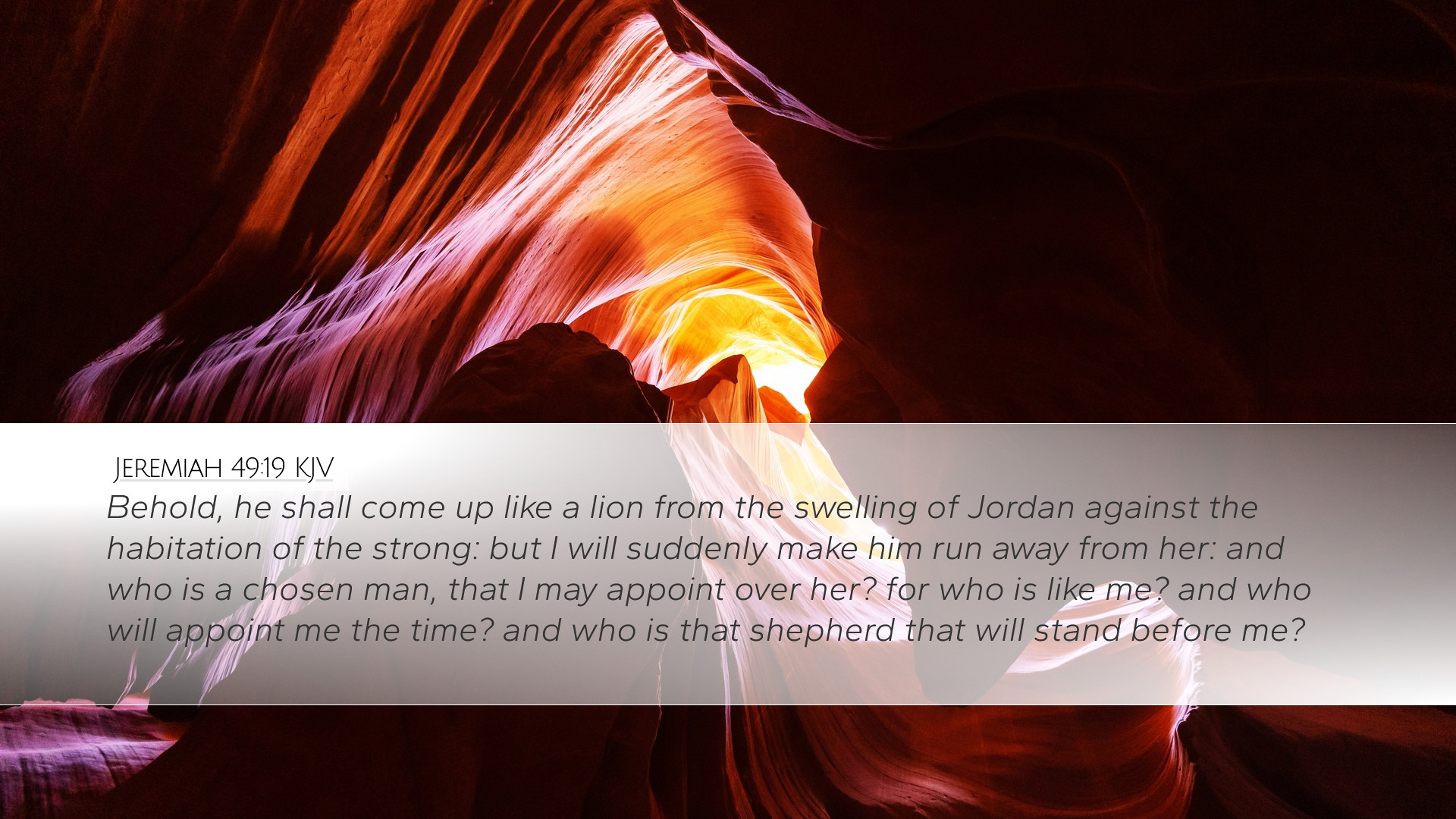Commentary on Jeremiah 49:19
Jeremiah 49:19: "Behold, he shall come up like a lion from the swelling of Jordan against the habitation of the strong: but I will suddenly make him run away from her: and who is a chosen man, that I may appoint over her? for who is like me? and who will appoint me the time? and who is that shepherd that will stand before me?"
Introduction
The prophetic declaration in Jeremiah 49:19 deals with the judgment of God against the nation of Edom, represented metaphorically as a lion coming from the floodwaters of Jordan. This metaphor captures both the ferocity and the strength of God's impending judgment. Various commentators have provided insights that reveal the depth of this passage, suitable for scholars, pastors, and students alike.
Contextual Background
This passage is part of a larger oracle against Edom, prophesying both destruction and the sovereignty of God over nations. Understanding the historical context is vital as it shapes the interpretation. Edom, descended from Esau, had a long history of animosity with Israel, rooted in familial strife that transcended generations.
Commentary Insights
Matthew Henry's Commentary
Matthew Henry emphasizes the portrayal of God as the sovereign lion that has authority over all. He points out that the "swelling of Jordan" signifies both the geographic and metaphorical strength of Edom, but in the face of God’s judgment, they will be unable to withstand His power. Henry elaborates on the imagery of the lion, indicating it represents both might and terror, showcasing how unprepared Edom would be when faced with divine wrath.
Albert Barnes' Notes
Albert Barnes provides a detailed analysis of the various phrases used in this text. He identifies the “lion from the swelling of Jordan” as a direct metaphor for the Babylonians, who would rise out of the powerful and unyielding conditions of their surroundings. Barnes explains the "habitation of the strong" as a reference to the fortified cities of Edom, highlighting the duality of their security in worldly strength versus their vulnerability to divine intervention. He also discusses the rhetorical question posed, emphasizing God's unparalleled authority — “who is like me?” — and concludes that these questions serve to affirm God’s supremacy over any earthly challenge.
Adam Clarke's Commentary
Adam Clarke's interpretation delves into the vivid imagery employed in this verse. He suggests the "swelling of Jordan" symbolizes threats and challenges faced by nations — reflecting their collective pride before their downfall. Clarke further notes the suddenness implied in the text, which mirrors themes throughout both the prophetic texts and the entire narrative of Israel’s history. His commentary also stresses the attribute of God as a shepherd, who holds the ultimate power to appoint leaders and decide their fate, thus challenging any illusion of human authority against divine will.
Theological Reflections
This verse invites deep theological reflection on the nature of divine sovereignty, judgment, and mercy. The portrayal of God as a lion reinforces the seriousness with which He regards sin and rebellion among nations. It also points to the comfort that believers can derive, knowing that God's justice will ultimately prevail. This can guide ministers in discussing God’s righteous anger and the hope for redemption in Christ, underscoring that God’s power is both a source of fear for the wicked and hope for the righteous.
Application and Exhortation
As Jeremiah conveys this message, pastors and leaders today can draw parallels between the ancient struggles of Edom and modern impasses faced by nations both spiritually and politically. The invincible power of God, demonstrated here, serves as a reminder to maintain faith in His promises. Leaders should use this passage to encourage the congregation to trust in God’s timing, plan, and righteousness, particularly in turbulent times.
Conclusion
Jeremiah 49:19 is a profound declaration of God’s sovereignty over nations, portrayed through powerful imagery and rhetorical questions that affirm His unmatched authority. The commentaries by Matthew Henry, Albert Barnes, and Adam Clarke provide a multilayered understanding that emphasizes the urgent call for recognition of God's might and a return to faithfulness in our lives. For students and scholars, this verse serves as a crucial reminder of historical context, theological themes, and pastoral implications that remain relevant today.


